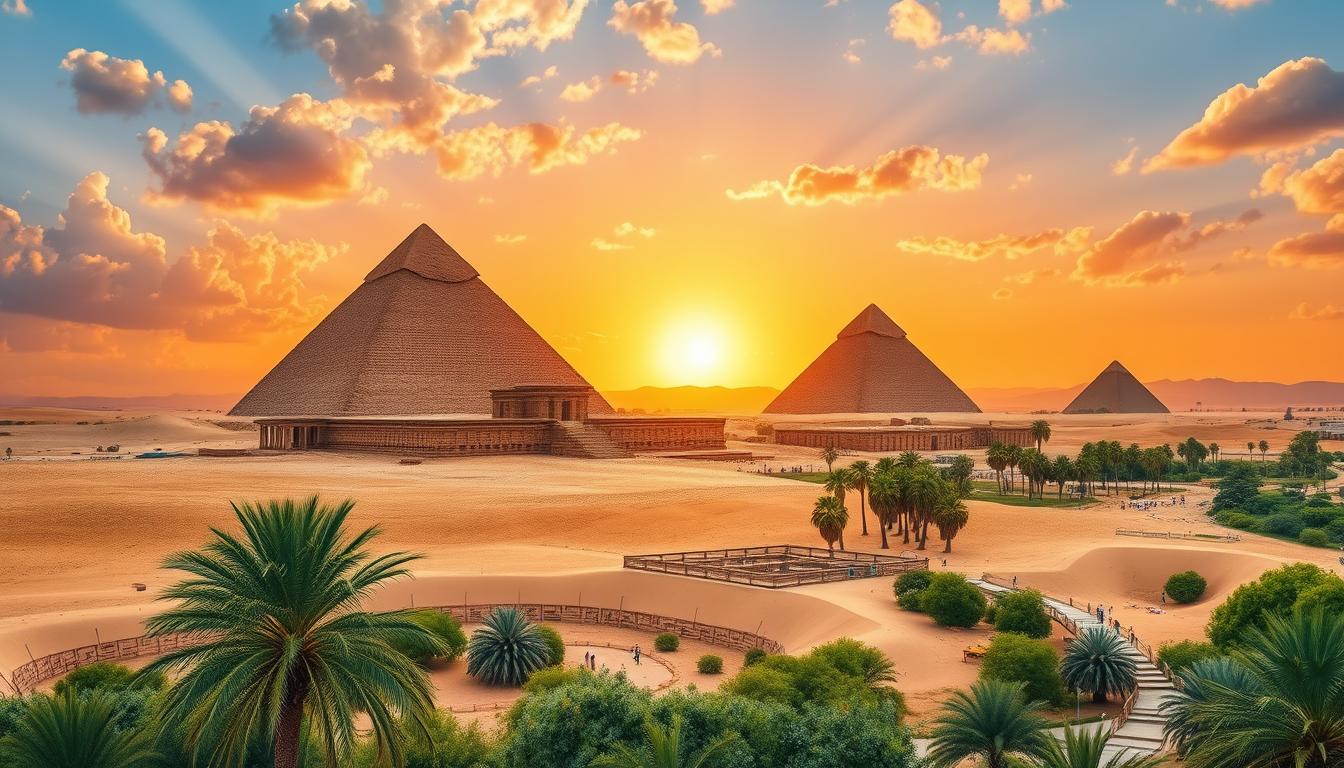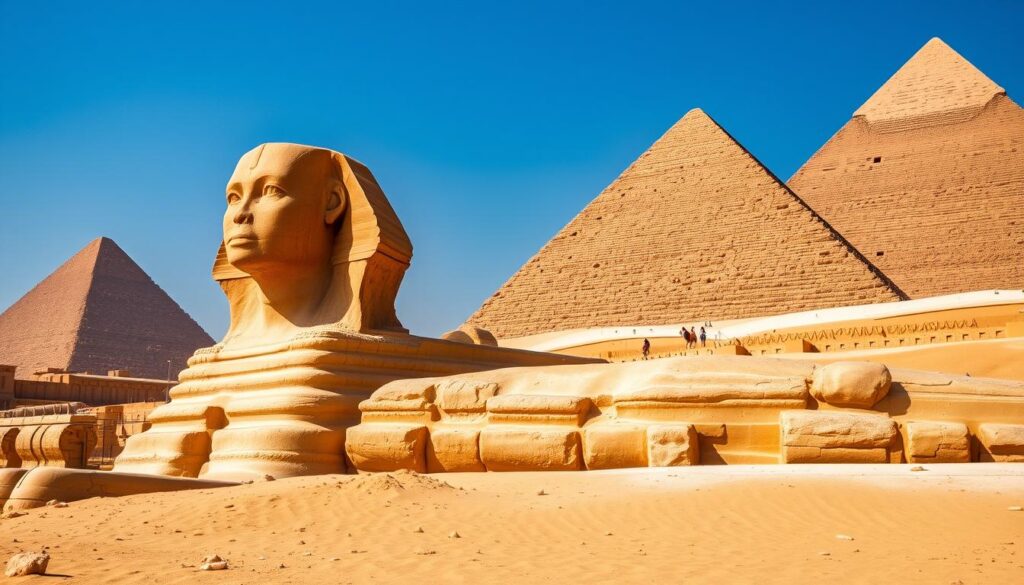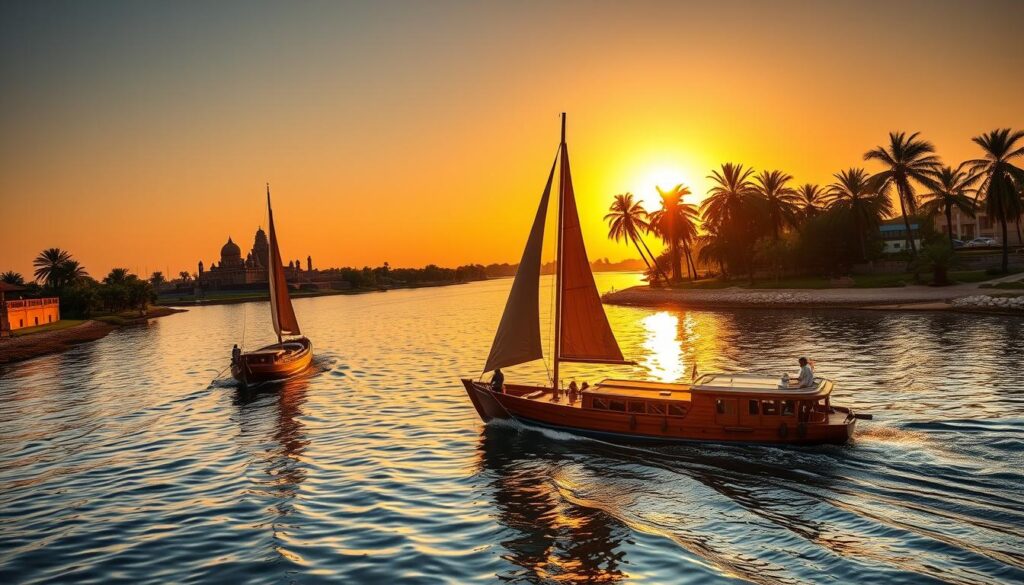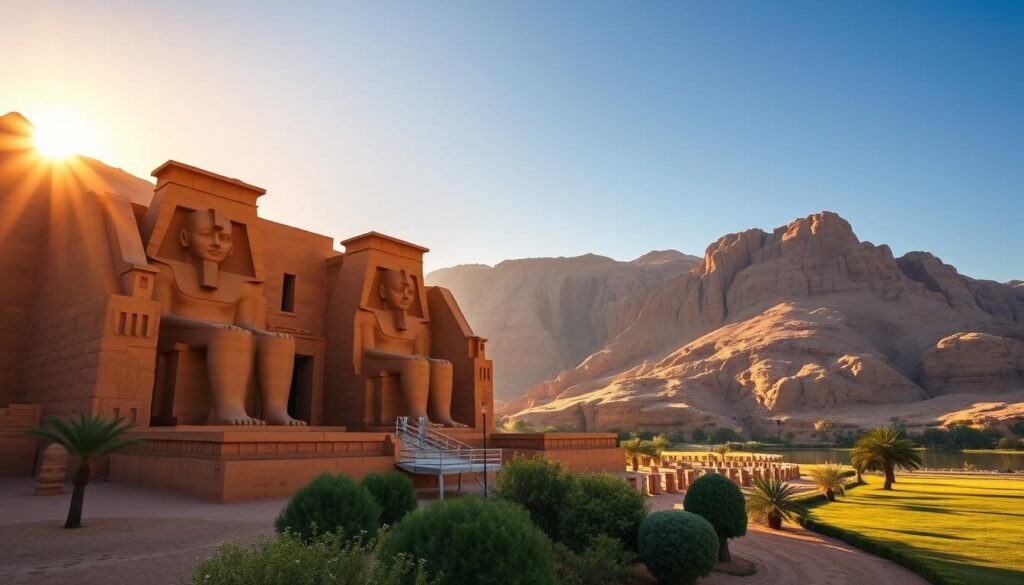Standing near the Pyramids of Giza, I felt awe at their grandeur. Egypt is a land of history, culture, and beauty. It’s a dream spot for those wanting to explore ancient wonders.
From the famous Pyramids to the calm Nile River, Egypt is full of amazing experiences. My trip showed me Egypt’s rich history through its attractions. Each place told a new story of this nation’s past.
Key Takeaways
- Egypt is home to seven UNESCO World Heritage Sites, showcasing its rich history and cultural heritage.
- Popular destinations include Cairo, Alexandria, Luxor, Aswan, and the coastal resorts of Hurghada and Sharm el-Sheikh.
- Visitors can explore ancient monuments, temples, and tombs, as well as enjoy outdoor activities like Nile River cruises and scuba diving.
- Egypt offers a diverse range of experiences, from the iconic Pyramids of Giza to the serene beaches of the Red Sea.
- The country’s vibrant markets, such as the Khan El Khalili Bazaar in Cairo, provide a glimpse into the local culture and cuisine.
Exploring the Pyramids of Giza
The Pyramids of Giza, on Cairo’s outskirts, are a top spot for travelers in Egypt. Built nearly 5,000 years ago, they are the only ancient wonder left. The Great Pyramid, for Pharaoh Khufu, is the tallest at 146.5 meters.
The Pyramids of Khafre and Menkaure also make up the Giza skyline. They show the ancient Egyptians’ skill in architecture. Inside, you can learn about their burial practices and engineering.
The Great Pyramid
The Great Pyramid of Giza, or Pyramid of Khufu, is the most famous. It was built with over 2 million stone blocks. It was the world’s tallest building for 3,800 years, until the Lincoln Cathedral in England was built in 1311 AD.
Chephren and Mykerinos Pyramids
The Pyramids of Khafre (Chephren) and Menkaure (Mykerinos) are also stunning. Built for Khufu’s sons, they show ancient Egyptian engineering and architecture skills.
The Giza Plateau offers views of Cairo on clear days. It’s a must-see for history lovers and tourists. Exploring the pyramids or admiring them from outside, they show the ancient Egyptians’ ingenuity and legacy.
“The Pyramids are the most impressive and majestic monuments of the ancient world. Their sheer scale and engineering feats are truly awe-inspiring.”
The Enigmatic Sphinx
The Great Sphinx guards the Giza Plateau, a symbol of Egyptian mythology and the Giza Necropolis. This creature, with a lion’s body and a human’s head, has amazed visitors for thousands of years.
History and Significance
Thought to be Pharaoh Khafre, the Sphinx is 20 meters tall and 73 meters long. It’s one of the biggest statues ever made. Built around 2560 BCE, its creation is still debated by scholars.
The Sphinx’s mysterious look has sparked many legends and theories. Its true purpose remains a mystery.
Visiting Tips
Visit the Great Sphinx early in the morning or at sunset. This way, you’ll see it in the best light and avoid the daytime crowds. A guide can share its history and cultural importance.
“The Great Sphinx has captivated visitors for millennia, inspiring various legends and theories about its purpose and construction.”
Luxor: The Ancient City of Thebes
Luxor is a treasure in the Nile Valley, once known as Thebes. It’s like an open-air museum, filled with ancient monuments. These sites take visitors back in time.
Valley of the Kings
The Valley of the Kings is on the Nile’s west bank. It’s home to 63 royal tombs, including Tutankhamun’s. The chambers are covered in hieroglyphics and hold amazing artifacts.
Karnak Temple Complex
The Karnak Temple Complex is on the east bank. It’s huge, covering nearly 500 acres. It has obelisks, halls, and statues of pharaohs. Visitors can explore and feel the grandeur of this UNESCO site.
| Site | Ticket Price | Visiting Hours |
|---|---|---|
| Karnak Temple | 120 EGP for adults, 60 EGP for students, 20 EGP for photography | 6:00 AM to 6:30 PM in summers, 6:00 AM to 5:30 PM in winters |
| Luxor Temple | 40 EGP for foreigners, 20 EGP for Egyptian and Arabs | 6:00 AM to 10:00 PM |
| Valley of the Kings | 600 EGP | October to April, 6:00 AM to 4:00 PM; May to September, 6:00 AM to 5:00 PM |
| Valley of the Queens | 180 EGP for adults, 90 EGP for children | April to September, 7:00 AM to 7:00 PM; October to March, 7:00 AM to 5:00 PM |
| Temple of Hatshepsut | 100 EGP for adults, 50 EGP for students | 6:00 AM to 5:00 PM |
| Luxor Museum | 120 EGP for adults, 60 EGP for children | 9:00 AM to 4:30 PM, Friday closed |
| Mummification Museum | Foreigners: Adult EGP 200, Student EGP 100. Egyptians and Arabs: Adult EGP 20, Student EGP 5 | Wednesday to Monday: 9:00 AM to 2:00 PM, Tuesday closed |
Luxor is a key spot for anyone exploring Upper Egypt. It’s filled with history and ancient wonders. From Ramses II’s statues to the Theban Necropolis, Luxor offers an unforgettable journey.
The Nile River: A Scenic Journey
Going on a Nile River cruise is a top way to see Egypt’s ancient sights. The Nile, the longest river, stretches 6,650km through 10 countries, with Cairo as a key stop. My trip usually goes from Luxor to Aswan, visiting places like the Temple of Kom Ombo. It’s dedicated to Horus and Sobek, the falcon and crocodile gods.
River Cruises
Nile cruises come in many styles, from fancy ships to traditional feluccas. These sailboats offer a real taste of the Nile. I can pick a 5- to 7-day trip, enjoying the views at my pace. The best time to go is from mid-October to February, when the weather is perfect.
Notable Landmarks Along the Nile
- The Temple of Edfu, a must-see, is dedicated to Horus, the falcon god.
- The double temple of Kom Ombo, built between 180-47BC, is another highlight. It has parts for Haroeris and Sobek.
- Traveling through the Nile locks near Esna lets me meet local vendors and see the riverbank culture.
Whether I pick a luxury ship or a felucca, seeing the Nile’s sights is unforgettable. With Egypt experts’ help, I can plan an amazing Nile River trip and make lasting memories.
| Nile River Cruise Details | Information |
|---|---|
| River Length | 6,650km (4,130mi) |
| Countries Traversed | 10 (including Egypt) |
| Cruise Duration | 5-7 days |
| Best Travel Season | Mid-October to February |
| Booking Requirements | 50% deposit, final balance due 15 days in advance |
| Cancellation Fees | Individual: 100 EUR admin fee, Group: 25-100% |
| Visa Requirement | Valid passport with 6 months remaining validity |
| Payment Options | Visa & Mastercard |
| Additional Recommendations | Travel insurance, tips for guides and staff |
Alexandria: A Coastal Haven
Alexandria sits on the Mediterranean coast, mixing ancient Greco-Roman history with a lively modern vibe. Founded by Alexander the Great in 331 BCE, it’s a city full of history and architecture. Visitors from all over are drawn to its treasures.
The Catacombs of Kom El Shoqafa
The Catacombs of Kom El Shoqafa is a top spot in Alexandria. Dating back to the 2nd century AD, it’s a mix of Egyptian, Greek, and Roman art. You can explore its underground chambers and see amazing carvings and sarcophagi.
Bibliotheca Alexandrina
The Bibliotheca Alexandrina is a modern marvel inspired by the ancient Great Library. It’s a hub of culture, with millions of books and events. You can dive into its vast collections and enjoy the stunning architecture.
Alexandria is a place of wonder, with its Mediterranean coast, Greco-Roman history, and Alexandrian culture. It offers a unique experience in coastal Egypt.
| Attraction | Cost | Highlights |
|---|---|---|
| Catacombs of Kom El Shoqafa | $5-10 USD per person | Unique blend of Egyptian, Greek, and Roman artistic styles, Rotunda chamber |
| Bibliotheca Alexandrina | Free admission | Millions of books, diverse exhibitions and events, iconic modern architecture |
“Alexandria was a centre of culture and learning in the ancient world, and the Bibliotheca Alexandrina is a magnificent tribute to this legacy.”
The Temples of Abu Simbel
In southern Egypt, near Sudan, lie the Temples of Abu Simbel. These huge structures were built over 3,000 years ago by Pharaoh Ramses II. The Great Temple is especially impressive, with four giant statues of the pharaoh, each 21 meters tall.
Ramses II’s Great Temple
The Great Temple of Abu Simbel took 20 years to build during Ramses II’s early years. It’s aligned so that twice a year, the sun shines on the inner sanctuary. This creates a beautiful glow on the statues of Ramses II and other gods.
The Relocation Efforts
In the 1960s, the Aswan High Dam threatened to flood the temples. A huge effort moved the temples to higher ground. This UNESCO World Heritage Site was saved by over 50 countries in 5 years.
Now, the Temples of Abu Simbel show the beauty of Nubian and Egyptian architecture. Visitors can see the amazing details and the work to save them from Lake Nasser. The trip to Abu Simbel is unforgettable, whether by air or road.
“The temples of Abu Simbel are a true wonder of the ancient world, a testament to the ingenuity and artistry of the ancient Egyptians. Seeing them in person is a truly humbling experience.”
Aswan: A Gateway to Nubia
Aswan is a special place in Upper Egypt, where the Nile River meets ancient wonders and Nubian culture. It’s Egypt’s southernmost city, a doorway to Nubia. Here, travelers can dive into a world of rich culture.
Philae Temple: An Island Gem
The Philae Temple is a must-see in Aswan, honoring the goddess Isis. Moved to Agilkia Island because of the Aswan High Dam, it’s saved for us to see. You can see amazing hieroglyphics and the Nile River’s beauty.
Nubian Culture and Experience
Aswan is known for its Nubian culture. Visit Gharb Soheil to see colorful houses and crafts. A ride on a felucca shows life on the Nile islands.
| Philae Temple Admission Prices | Nubian Museum Admission Fees |
|---|---|
| Adult: 450 EGP Student: 230 EGP |
Adult: 300 EGP Student: 150 EGP |
Stay at the Aswan Old Cataract Hotel for a classic experience. Or, choose the Eco Nubia Hotel for modern, eco-friendly living with Philae views.
Aswan is a unique spot for exploring Upper Egypt and Nubia. It’s where ancient history meets modern culture. Visit the Philae Temple and Nubian villages for a memorable trip.
Siwa Oasis: A Desert Gem
The Siwa Oasis is in Egypt’s Western Desert. It’s a mix of natural beauty, ancient history, and culture. This oasis, home to the Berber people, is perfect for those looking for something different.
The Oracle Temple of Amun
The Oracle Temple of Amun is a key spot in Siwa. It’s famous because Alexander the Great visited here. You can see the ruins and think about its past importance.
Unique Lifestyle and Scenery
Siwa Oasis is known for its unique lifestyle and natural scenery. The Amazigh (Berber) people keep their culture alive. You can see old Shali, enjoy hot springs, and try desert activities like sandboarding.
It’s also famous for its high-quality dates and olives. These are big in the eco-tourism scene. Visiting Siwa can be affordable, with tours starting at $100 per person.
| Attraction | Ticket Price |
|---|---|
| Temple of the Oracle | 25 Egyptian Pounds (~$1) |
| Shali Fortress | Free |
| Salt Lakes | Free |
| Dune Safaris | 1000-4000 Egyptian Pounds (~$60-$250) |
Siwa Oasis is special for its ancient oasis, Berber culture, and eco-tourism. It’s a desert gem waiting to be explored.
Red Sea Resorts: Sun and Fun
The Red Sea coast in Egypt is home to top beach resorts. They mix relaxation with adventure perfectly. Places like Sharm El Sheikh and Hurghada offer fun in the sun and water sports.
Sharm El Sheikh: A Diver’s Paradise
Sharm El Sheikh is at the southern tip of the Sinai Peninsula. It’s a Egyptian beaches highlight. The town is famous for its coral reefs and is great for diving and snorkeling.
Visitors can see amazing marine life at Ras Mohammed National Park. It’s known for its underwater beauty.
Hurghada: A Hub for Water Sports
Hurghada is on the mainland coast and is a top spot for water sports. It offers many activities like diving, snorkeling, windsurfing, and kiteboarding. The coral reefs and water sports make it a favorite for active vacations.
Both Sharm El Sheikh and Hurghada have luxury resorts. They are perfect for a relaxing and indulgent getaway. These places offer a mix of calm and adventure, letting visitors enjoy the sun, marine life, and Egypt’s culture.
“The Red Sea coast in Egypt is a true natural wonder, offering a diverse array of marine life, stunning coral reefs, and endless opportunities for water sports and relaxation.”
Cairo’s Vibrant Markets
Cairo’s markets are a feast for the senses. They offer a glimpse into Egyptian culture and commerce. The legendary Khan El Khalili Bazaar is at the heart of this scene. It’s a maze of alleys and streets that have attracted people for centuries.
The Khan El Khalili Bazaar dates back to the 14th century. It’s a treasure trove of traditional crafts and Egyptian souks. Walking through, you’ll see shops full of handmade crafts, shiny jewelry, and spices. There are also many souvenirs to choose from.
The markets are more than just places to shop. They offer a chance to try street food like koshari and Egyptian pastries. In Islamic Cairo, you can enjoy the local food culture. The area’s architecture is also worth seeing.
| Souk Name | Established | Specialties | Opening Hours |
|---|---|---|---|
| Souk Al-Fustat | 7th century | Textiles, Carpets, Leatherwork | 9 am to 8 pm |
| Souk Al-Attarine | 14th century | Perfumes, Incense, Spices | 9 am to 9 pm |
| Khan El Khalili Bazaar | 14th century | Jewelry, Crafts, Souvenirs | 9:30 am to 12 am |
Looking for unique souvenirs or wanting to dive into local culture? Cairo’s markets are a must-see. They offer unforgettable experiences and flavors of Egypt.
Cultural Heritage and Museums
Exploring Egypt’s history is a journey through time. The country’s museums are filled with treasures that show its rich past. The Egyptian Museum in Cairo is a highlight, with the world’s biggest collection of ancient Egyptian artifacts. It includes the famous treasures of Tutankhamun.
This museum gives visitors a peek into the lives of pharaohs. It’s a place where history comes alive through stunning Egyptian antiquities.
The Museum of Islamic Art in Cairo is another gem. It displays Islamic textiles, ceramics, and metalwork from different times. This museum shows how Islamic heritage has evolved, mixing old and new styles. It’s a key place for learning about Egypt’s Islamic culture and art.
The Grand Egyptian Museum near the Giza Pyramids is set to open soon. It will be the biggest archaeological museum globally. It promises to showcase Egypt’s history and treasures like never before. I’m excited to visit these museums and learn more about Egypt’s cultural heritage.







